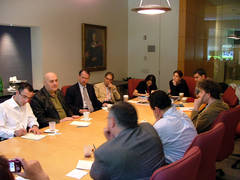
On April 30, 2010, Policy Forum Armenia held a roundtable discussion on Karabakh hosted by the Carnegie Endowment for International Peace in Washington, DC. The speakers were Igor Muradyan, an independent analyst and one of the main initiators of independence movement in Karabakh in 1980s—who is visiting Washington at the invitation of PFA—and Thomas de Waal, Senior Associate in the Russia and Eurasia Program at the Carnegie Endowment.
Moderator Dr. David Grigorian thanked the Carnegie Endowment for hosting the discussion, the panelists for agreeing to share their views, and the attendees for joining. The following is the summary of the points made by speakers:
Thomas de Waal
- Minsk Group negotiations process is almost dead, but there appears to be no alternative to it;
- The confidential nature of negotiations (where only a few people know the details) is not helping. This results in asymmetry between the true content of the talks and what is shared with the public and creates room for manipulations;
- Karabakh is excluded from the negotiations and ends up playing an obstructionist role in the process;
- The Madrid formula appears to be mutually beneficial;
- Bellicose rhetoric, present on both sides (albeit in different degrees), is not conducive to normalization and progress in talks;
- Path for resolution: Armenia should declare that it has no claims on territories beyond the borders of former NKR, which should then trigger Baku’s granting Karakakh a very high level of autonomy with some attributes of independence.
Igor Muradyan
- The August 2008 operation in Ossetia expedited the Karabakh talks on a bilateral basis;
- Russia-Turkish rapprochement too contributed to the process and created a fertile ground for “football diplomacy”;
- The value of Armenia-Turkey protocols is not in the establishment of diplomatic relations or the potential economic gains but in creating security in the region. This has failed, however, as the environment is much more tense now than it was before the start of the “football diplomacy”;
- Events that unfolded recently have on the balance reduced the interest of parties in the resolution of the Karabakh problem;
- War on the Karabakh front remains unlikely as long as Azerbaijan is on its own, but triggers for a new war on that front could come from Turkey;
- The negotiating sides should keep in mind that had the Armenian side lost the war in 1994, there would have not been any international pressures on Azerbaijan to allow for the return of the Armenian refugees or to make any territorial concessions for that matter;
- It is unlikely that politicians in Baku will ever forget that Turkey “went behind their backs” to negotiate with Armenia on border opening. Turkey’s backtracking in the recent weeks was a result of formidable pressures from Azerbaijan.
A lively discussion followed after the presentations that touched upon the costs and benefits of any concessions on the Armenian side; the ability of official Yerevan to handle complex negotiations on multiple fronts; the economic and developmental dimension of the conflict; as well as incentives (or lack thereof) of world powers in achieving normalization in the region.
The roundtable ended on a note that no political solution of conflicts in the modern history has ever changed the prevailing military outcome.
